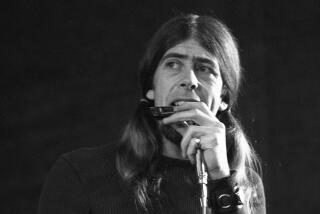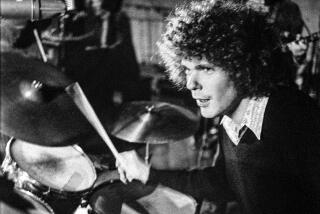*** 1/2 DEXTER GORDON, “The Complete Blue Note Sixties Sessions,” Blue Note
- Share via
Dexter Gordon had a long, prolific and well-chronicled career as a jazz tenor saxophonist, and his impact upon the players emerging in the ‘50s is still apparent in the work of Sonny Rollins and Benny Golson (among others). Those facts alone would seem to be sufficient justification for his continuing visibility as a jazz icon (he died in 1990, at the age of 67).
Yet, even for many jazz listeners, Gordon is best-known not for his music, but for his Oscar-nominated role in the Bertrand Tavernier film “Round Midnight” (1986). The character he played, loosely based on the life of pianist Bud Powell (who, like Gordon, spent years living in Europe as an expatriate), was a kind of quintessential image of the jazz man as outsider. And, perhaps because in some respects it reflected the drug-plagued lifestyle of numerous jazz musicians (Gordon included) in the ‘50s, he played it with a compelling, cinema verite reality.
Despite the similarities to his “Round Midnight” characterization, however, Gordon’s own life was far more complex, filled with roller-coaster intervals of feast and famine. And his music remains one of the important legacies of post-World War II jazz.
The performances contained in this beautifully packaged set of seven CDs trace to the years from 1961 to 1965--a period that can best be described as the first of Gordon’s three significant comebacks, after having spent portions of the ‘50s incarcerated for drug problems. (His other comebacks included a triumphant return to the United States in 1976, after living in Europe for more than a decade and, after health problems caused another relatively inactive period in the early ‘80s, his role in “Round Midnight.”)
The dates were recorded during a time of great ferment and change in jazz: Ornette Coleman and John Coltrane were stretching the limits of improvisation, while, at the opposite end of the musical spectrum, Stan Getz was reaching large pop audiences with his bossa nova outings. But, except for a few Coltrane-esque touches in some of the later sessions, and a brief bow to Brazil with a highly personalized rendering of “Manha de Carnival,” Gordon sticks to his hard-driving, straight-ahead mainstream style. Among the original Blue Note albums represented here are all the tracks from the much-praised “Go!” and “A Swingin’ Affair” (both recorded in 1962).
Gordon played everything with attitude. The most immediately noticeable aspect of his soloing--obvious on every track in this collection--was the magisterial force he brought to his improvisations. His tone was upfront and solid, clearly influenced by such earlier tenor players as Don Byas and Coleman Hawkins, but with a brusque edge that was uniquely his own. And his lines--if occasionally too saturated with quotations from other tunes when his imagination lapsed--were determined, almost aggressive statements, virtual definitions of the uplifting rhythmic momentum identified as “swing.”
Gordon’s musical associates included many of the finest rhythm section players of the period. Among them: bassists Paul Chambers, Ron Carter, Butch Warren and Bob Cranshaw; pianists Barry Harris, Kenny Drew, Sonny Clark and Powell; drummers Philly Joe Jones, Kenny Clarke and Billy Higgins; along with the occasional participation of trumpeters Freddie Hubbard and Donald Byrd and vibist Bobby Hutcherson. The results are almost universally first-rate, on a par with his later recordings on Steeplechase, and a worthy entry in anyone’s jazz collection.
As an added bonus, several of the CDs add spoken commentary from Gordon, and the program notes provide some fascinating, often humorous selections from his correspondence with Blue Note owners Francis Wolff and Alfred Lion.
*
Albums are rated on a scale of one star poor), two stars (fair), three stars (good), four stars (excellent).
More to Read
The biggest entertainment stories
Get our big stories about Hollywood, film, television, music, arts, culture and more right in your inbox as soon as they publish.
You may occasionally receive promotional content from the Los Angeles Times.










